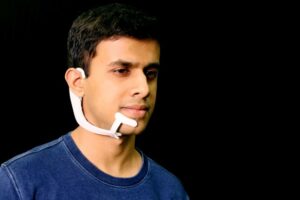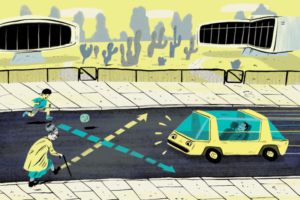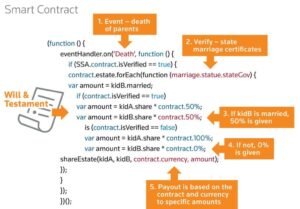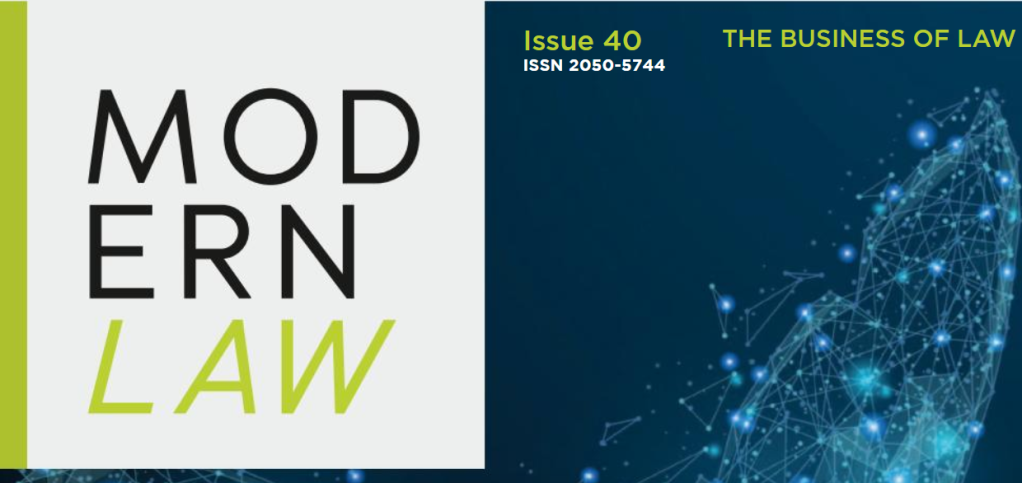Here is my latest post from Modern Law Magazine.
By Joseph Raczynski
Over the course of the next five years, the legal industry will be flush with opportunity. While much of the rote legal work will be done by automation, producing a period of interstitial angst at law firms, burgeoning areas of technology necessitating legal counsel will flourish.
As a brief preface, I will bypass the normal discussion surrounding how tools are making lawyers more productive and law firms more profitable. That is a given. These tools are plentiful; including research services that coalesce information intuitively tools that comb through millions of documents seeking relevant words; or, artificial intelligence (AI) enabled applications reviewing 10,000 contracts in hours compared to months required when done manually. While these applications constantly improve, they are becoming commonplace for law firms. This article’s focus is preparing for the next legal transformation for law firms—prompted by technological advances.
A near trite concept at this juncture, technology is advancing at an exponential pace which is creating incredible possibilities in many industries—especially within the legal industry. One example which typifies this acceleration is a recent creation at MIT Labs with ‘AlterEgo’.
The white device below wraps around the ear, hugs the lower jawline, and rests below the lips. It contains four sensors that can hear your internal thoughts. Yes, AlterEgo can read your mind. Practically, without verbalizing a word one can communicate with Internet connected devices, like a TV, a computer, or a car. A conversation with another person wearing AlterEgo could occur without verbalising a word. This is a single example, of a possible myriad, which exemplifies our current era of swift technological change.

AlterEgo, MIT Labs http://news.mit.edu/2018/computer-system-transcribes-words-users-speak-silently-0404
With this sort of mind boggling technology available, it raises the question, what will the legal landscape look like in the future and how can lawyers and law firms adjust to this sort of rapid change?
Algorithms
Specific instructional processes (if/then statements), known as algorithms, have existed in computer language for decades. Over the last five years algorithms have matured, but perhaps more importantly so has the flood of data—widely considered the new oil. The synthesis of the advanced algorithms and the ability to process that data has ushered in new industries.
One such industry is driverless cars. These vehicles are already being used around the world, and algorithms are a main operational feature in the car’s computer driving programme. This area of technology, alone, will be a significant boon to the legal industry. The implications of rules, regulations, laws, and ethics in this space are immense. Lawyers will need to be trained, or at the very least be far more familiar with how various algorithms work. Who decides culpability when driverless cars go awry? How do we navigate the legal ethical dilemmas of onboard computers deciding between hitting a child or an elderly person crossing the street?

Politico Europe https://www.politico.eu/article/should-a-driverless-car-kill-the-kid-or-the-retiree-future-of-driving/
Algorithms are a platform and will permeate most applications, propagating throughout most of our lives. Lawyers will likely need to understand their uses and implications, in the near future, in order to provide adequate representation to their clients.
Biotech
Over the last decade, engineers have deciphered how to modify the immune systems of bacteria to edit genes in other living organisms, like algae, small mammals—and now humans too. Over the last month, Chinese doctors claimed to have created the first designer baby by enabling one to be born which is resistant to HIV, by genetically alerting the embryo. CRISPR, pronounced “crisper”, allows scientists to easily manipulate genes far faster and cheaper than ever before. Soon there will be significant work for law firms in this space. The implications are vast beyond how an IP lawyer would practice. A multitude of various specialised practice areas will now join the IP lawyer. When new genetically modified humans arrive, smarter or with greater athletic ability, opportunities will bloom for many other practice areas. This will also impact the insurance industry, as two classes of humans will evolve creating different playing fields. Will genetically modified humans receive better insurance rates, because they are less susceptible to disease? There are countless other legal impacts with CRISPR and gene alteration impacting multiple areas of law and business.
Internet of Things (IoT)
With as many as 50 billion devices connected to the internet over the next ten years, we need lawyers able to understand the legal ramifications of this rapidly expanding technological reach. The depth and breadth of these interconnected gadgets cannot be underestimated, including devices connected to our brain, such as AlterEgo, to every appliance in a kitchen, car, phone—which will soon be a MR (Mixed Reality) headset. Within this scope, countless questions of data ownership, privacy, regulation, and intellectual property will arise. Education of how these devices work and what information is being gathered, perhaps surreptitiously, will all need to be understood by lawyers.
Deep Fakes
One of the more distressing developments of the last few years has been the creation of videos known as the Deep Fakes. The Deep Fakes are very realistic videos of someone famous, but are made by superimposing a computer-generated face on the real video and swapping out the audio with something nefarious. (Example: https://www.youtube.com/watch?v=gLoI9hAX9dw ) Lawyers will need education and access to tools to help verify what is real and what is not for litigation purposes as well as transactional, as people increasingly make claims using video attestation. We will soon get to a point where we cannot trust video documentation and lawyers will have to contend with these issues.
Blockchain
The ’trustless’ nature of a distributed ledger will undoubtedly have an impact on the legal industry, since transactions will be put on a blockchain. Increasingly there are whispers of a legal blockchain controlled by law firms in a consortium. This will impact most areas of legal practice.
In the transactional practice, self-executing ‘Smart Contracts’ will be something everyone working in the legal profession will need to understand. Ethereum, the first blockchain platform to popularize the idea of the Smart Contract allows for people to code ‘if/then’ statements onto the blockchain or database with ease. Here is a scenario that uses a smart contract on the blockchain in the legal transactions.
A lawyer writes a will for their client. The will stipulates that upon the parent’s death—their two kids must be married, respectively, in order for them to receive a share of the estate. If one kid is married and the other kid is not, the kid that is married receives all assets. For simplicity the assets are all liquid in this example.
The will is written and saved to a blockchain. It is in an immutable state, and the only people that have access to this document is the lawyers that drafted the will and her client. Once it is on the blockchain in a codified state, the smart contract starts checking every day through a trusted source, called an oracle (affirmed public record), to see if both parents are alive. One day the computer identifies that the parents have both died. The computer jumps to the next task to determine if both kids are married. Through another computer call to that oracle, it determines that one kid is married and the other kid is not, and subsequently sends 100 percent of the liquid assets to the kid that is married. This is a self-executing smart contract on a blockchain as shown below.

JoeTechnologist.com https://joetechnologist.com/2018/11/15/forum-magazine-blockchains-promise-verifying-value-one-block-at-a-time/
Drones
A drone superhighway is coming. These are roadways in the sky where drones will be able to operate, away from the likes of Gatwick airport and other important safe zones. The ’droneification’ of our delivery systems will alter city landscapes. Lawyers will be called upon to interpret zoning laws, environmental conditions, insurance issues, labour law, privacy matters, liability issues, and construction law—as more people build landing pads off their flats. The age of drones will create a beehive of activity for law firms.
Cybersecurity
By nearly all accounts Cybersecurity is the top concern for corporations and law firms outside of profitability. Data leakage and hacks are rampant the world over. Ransomware will likely continue for the next several years at least. According to one government official I recently met in the US, the world is simply waiting until the first significant cyber event which takes down a country’s infrastructure—such as the electrical grid, banks, or water systems. Law firms have rightly responded to the rapid increase of cybersecurity considerations over the last eight years. Increasingly lawyers will need to better understand the dynamics of cyber-breaches for their own operation as well as client needs. The opportunity for law firms is immense in this space from litigation to advisement of mitigation measures for cybersecurity.
How Law Firms Can Thrive
A renaissance in the legal industry is ahead, after a bit of discomfort based on some traditional legal work fading. As some of the rote work legal work dissipates in the coming years, an abundance of legal activity will commence in the emerging landscape driven by technology innovation. What I have discussed with law firms around the world is how they plan to prepare for the changes ahead.
- Firms are beginning to create highly customizable technology education plans for their lawyers. They are inviting specialist from the newest industries: AI, blockchain, automotive, cybersecurity, IoT, and biotech. At a minimum, these required firmwide classes promote a basic understanding of each technology. The goal is for lawyers to be conversant in the technology when speaking to prospective clients. The plan creates a pathway for deeper levels of education if their practice necessitates it, which will be likely for many.
- We are also seeing the early stages of more technical lawyers emerging. Traditionally, an IP lawyer carries this torch, but this is changing. Recently a blockchain consortium disclosed that lawyers make daily inquiries about how they can code blockchain enable technologies. Certainly not all lawyers will need to code, but those that have a proclivity for it will be better positioned for success.
- Law schools around the world are pivoting. They still hold fast to the core curriculum, but quickly programming around emerging technologies is taking root. Law schools are connecting with startups—creating a synergy between the nascent legal minds and innovation. Universities are also partnering with some of the traditional legal sector vendors to aid students in understanding various technologies, processes, and applications for more efficient work with the business and practice of law. Advanced institutions are pushing students to understand algorithms, code, and become further enmeshed in technology.
- Law firms are also sponsoring hackathons. The goal here to figure out better ways to improve process, which does not always have to be technical. Legal tech incubators have also started to proliferate by vendors, but also among some law firms.
- When gaps in technology exist within a law firm, tighter partnerships with companies who can assist on the legal technical aspects surrounding the mentioned fields will start. Boutique firms will arise with a focus on these technologies to help their clients, but also serve as consultants to the larger mid-sized firms without expertise.
- There is little question that litigation will thrive going forward in each of these disciplines. Lawyers that become more technologically savvy will have a decided advantage in obtaining business.
The era of abundance in the business and practice of law is on the horizon. The technological shifts that are occurring all over the world are setting up law firms, who are prepared, for bold new opportunities. One of the most important changes in the legal industry will be a need for lawyers to be educated on new technologies. As AI and blockchain become mainstream, those platform technologies will impact nearly every industry—meaning nearly every practice area lawyer will have to understand the basics of those technologies. The firms that embrace these changes afoot, will be best positioned to thrive.
Images from article:


Leave a Reply
You must be logged in to post a comment.